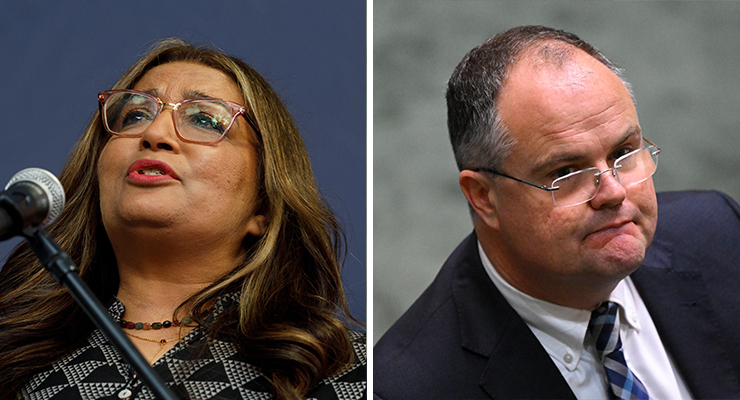
Labor could be forced into a round of deal-making with the crossbench after newly announced reforms to the safeguard mechanism, a core tenet of its climate policy, were opposed by both the Coalition and the Greens.
The reforms, set to take effect from July, aim to deliver 205 million tonnes of emissions abatement before 2030 by requiring Australia’s 215 biggest emitters to cut their greenhouse gas emissions by 4.9% every year until the end of the decade. The reforms will also cap the carbon price at $75 a tonne for miners and other high-emitting industries.
Those unable to reduce their required emissions reductions on schedule will have to offset their shortfalls by buying controversial carbon credits, which were only recently given a clean bill of health by an independent review panel after claims the offset market had been a vehicle of rorts and fraud.
Experts and members of the crossbench fear the role that carbon credits play in the package could give major emitters a free ride, and that there was nothing to stop them buying their way out of their obligations.
Acting Greens Leader Mehreen Faruqi said the party wouldn’t give a second thought to leveraging its balance of power in the Senate to block the expansion of new coal and gas projects, which it says will continue within the framework of Labor’s reforms.
“Coal and gas are making record profits,” she said. “Buying offsets is just coins down the back of the couch for them. Coal and gas can’t be allowed to just buy their way out of real pollution cuts with dodgy offsetting.
“Labor says this law is about Australian industry, but really it’s directly about coal, oil and gas, with 57% of the pollution covered by the law coming from those three climate-destroying industries.”
Australian business, however, was largely receptive to the package, which Climate Change Minister Chris Bowen said would be crucial to ongoing foreign investment.
The Business Council of Australia called the reforms a “measured” step towards shoring up Australia’s competitive footing on the international stage, with the caveat that it would be likely to require “ongoing consultation” to be a success.
The cautious optimism was shared by Minerals Council of Australia chief executive Tania Constable, who commended the move to introduce price caps, even if they came out higher than she would have liked.
To sweeten the deal with trade-exposed exporters, the reforms also earmark $600 million from the government’s $1.9 billion Powering the Regions Fund for grants to help high-emitting entities — and the regional areas in which they are located — cover decarbonisation efforts.
Australian Industry Group chief executive Innes Willox also welcomed the announcement, praising Labor’s “cost-reduction and flexibility features”, which he thought left “no risk that Australia loses industries” as a result of the reforms.
The Coalition, though, doesn’t agree. Opposition climate change and energy spokesman Ted O’Brien claimed the changes were set to bring about “new government-imposed costs” to businesses, and “regional Australia is set to be the biggest casualty”.








Carbon Credits are a scam
Ah, the Opposition. Never allow consensus and agreement to get in the way of a potential scare campaign.
Capping emissions is doomed to be crippled by favouritism. Apart from political mates getting off scot-free, everyone emitting under that cap is being legitimised to continue emitting full blast. If we will really are going to make emissions expensive, we should be taxing all fossil fuels before they leave the site of production. Tax cannot be dodged if it has already been paid. Everyone without fossil-free energy would be under price pressure, whether a power station, a smelter, a gas guzzler or a backyard barbecue. In turn that would put the governments under pressure to provide everyone with fossil-free power, including synthetic fuel.
Carbon credits are a scam. The only thing that can work is a carbon tax. We had one once but it was destroyed by toxic Tony with the help of the greens of all people. We need better politicions.
Who’s surprised the resources sector and big business are ‘cautiously’ welcoming reforms to the safeguard mechanism. Labor’s so weak on climate policies they’re actually jumping for joy! We’re still one of the largest land clearing nations, we’re still expanding fracking, we’re still not subsidising the EV industry, the list goes on. And on and on.